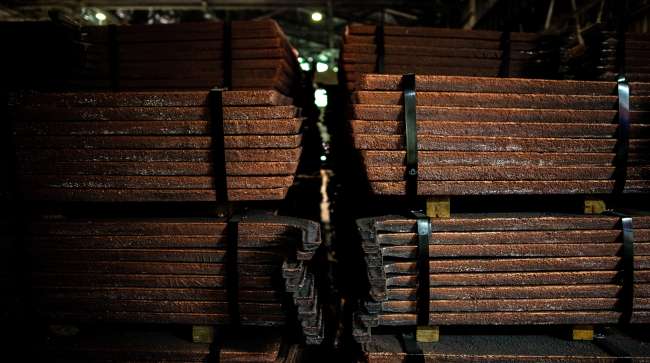As Trump prepares to slap a 50% levy on imported copper as of Aug. 1, the global supply chain is sweating on details of the measure. (Cristobal Olivares/Bloomberg)
U.S. buyers of copper will pay a high price if President Donald Trump pushes ahead with a 50% tariff on refined metal as opposed to products such as wiring, according to producers and analysts.
As Trump prepares to slap a 50% levy on imported copper as of Aug. 1, the global supply chain is sweating on details of the measure. The government of Chile, which accounts for about 70% of metal shipped to the U.S., is pushing for exemptions, arguing that U.S. manufacturing has little immediate alternative given America relies on imports for almost half its copper needs.
Taxing U.S. makers of intermediate forms of copper such as wires, rods and tubes for their purchases of foreign metal would drive up production costs, eroding their international competitiveness, said Alice Fox, an analyst at Macquarie.
“Undoubtedly that would put pressure on makers of copper products in the U.S., and so it is a concern,” Antofagasta PLC CEO Ivan Arriagada told reporters in Santiago on July 10.
For Chilean suppliers like Antofagasta, the U.S. represents about a 10th of total copper sales, a level dwarfed by shipments to China. While tariffs on refined metal may lead to increased domestic smelting and boost profits for mines, they’re unlikely to trigger major mining investments on their own. In the U.S., it can take decades to go from discovery to the start of production.
Exemption Calls
Chile, which hasn’t received any formal notification and is unaware of the details of the 50% tariff, has been seeking an exemption in its discussions with U.S. officials, Mining Minister Aurora Williams said July 10.
Chilean producers ship “top-notch refined copper with high levels of traceability, so we are interested in that being duly recognized not just in the U.S. but the whole market,” the minister told reporters. “Chilean mining production, in all its gambits, has high responsibility, is highly valued and highly necessary for manufacturing in the U.S.”
While Williams took a measured approach to Trump’s announcement, Canadian Industry Minister Melanie Joly vowed to “fight.” Canada denounces “illegal” tariffs, which are a direct attack against its workers, she told reporters July 10 on the sidelines of an event in Vancouver. The country is the second-largest foreign supplier of copper to the U.S.
The copper market is likely to remain volatile, Arriagada said. Once tariffs are introduced, U.S. consumers would draw from stockpiles built up ahead of time, impacting demand. Macquarie estimates the drawdown will take nine months. Still, global supply-demand fundamentals remain pretty strong.
Last year, the U.S. produced 850,000 tons of refined copper from ore and relied on imports for another 810,000 tons, with 5% of demand met through recycling and inventory drawdowns, according to Bloomberg Intelligence. With just two active smelters, the U.S. exports about half of the semi-processed ore from its mines — with half of that going to China.
Changing that will take time. Meanwhile, tariffs on refined metal could lead to a flood of semi-fabricated copper products, if they aren’t subject to the levies, according to Bloomberg Intelligence analysts Alon Olsha and Richard Bourke.
“Without broader incentives and tariffs on semi-finished goods, import reliance will likely persist and hurt copper consumers,” they wrote.






